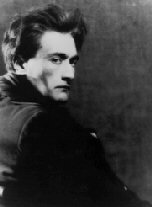
 Antonin Artaud
Antonin Artaud

 Antonin Artaud
Antonin Artaud
By Robert S. Robbins
Antonin Artaud was a French film actor, mad poet, and theater theorist, 1896 to 1948. His work is considered essential reading for theater artists. Artaud rejected the theater of realism and psychology. He proposed a theater of sensations that would bring art closer to the vital aspects of life. The theater is the only art form which can be experienced as sensation. Theater has a physical presence and can present the spectator with living forms, light, physical space, and sound. It is understandable that artists should turn to the theater to seek the perfect union of art with life. But Artaud also sought a metaphysical dimension in theater, the essence of life instead of realismís literal imitation of life, "And the public will believe in the theaterís dreams on condition that it takes them for true dreams and not for a servile copy of reality; on condition that they allow the public to liberate within itself the magical liberties of dreams...".
 The theater community
has undoubtedly embraced Artaudís demands for a theater fixated on the means
of production but has ignored the goal of spiritual excitement. Our theater
may make lofty claims to provide visionary theater but this is mere
hyperbole. The slightest venture into metaphysics or surrealism is actively
discouraged on our stages for fear of mystifying and alienating the
audience.
The theater community
has undoubtedly embraced Artaudís demands for a theater fixated on the means
of production but has ignored the goal of spiritual excitement. Our theater
may make lofty claims to provide visionary theater but this is mere
hyperbole. The slightest venture into metaphysics or surrealism is actively
discouraged on our stages for fear of mystifying and alienating the
audience.
In order to create sensations, Artaud suggested a Theater of Cruelty that would provide shocks, disturbing images, revolting spectacles, and other attacks on the spectatorsí sensibilities. Only this excitement could provoke a reaction in the spectators and possibly even involve them on a gut level. However, he also proposed a refinement of gesture, speech, and dance calculated to produce a sensation rather than an intellectual appreciation. He also emphasized the rather idealistic goal of communicating the essential by transcending words. Words lead to a purely intellectual comprehension while gestures may have an eloquence that communicates on the deeper level of intuitive comprehension, "But by an altogether Oriental means of expression, this objective and concrete language of theater can fascinate and ensnare the organs...Abandoning Occidental usages of speech it turns words into incantations...It liberates a new lyricism of gesture which...ends by surpassing the lyricism of words...What is important is that, by positive means, the sensitivity is put in a state of deepened and keener perception."
What interests me the most in Antonin Artaud is his striking familiarity with heightened states of perception. It should be obvious that he enjoyed an intimacy with the sublime through aesthetic experiences. His appreciation and intuitive comprehension of Balinese Theater led him to reject the text and seek a poetry without words, in gesture and stylized dance, "There is a low hum of instinctual matters in this theater, but they are wrought to that point of transparence, intelligence, and ductility at which they seem to furnish us in physical terms some of the spiritís most secret insights".
His phrase, "the spiritís most secret insights", is very interesting. Clearly Artaud knew these secrets. I think his lifeís struggle was to convey these secrets and not the pursuit of these secrets as his trip to Mexico to experiment with psychedelic mushrooms might suggest.
Artaud had unreasonable expectations for the theater. He sought to bring the essential to the stage and give theater a significance it can never have. It is tempting to see in theater the potential for making the unreal a presence in this world, but theater only gives the appearance of a magical union of illusion with reality. Also, the theater is no longer the stage for important cultural events in our society. A film premiere is more likely to be heralded as a major event and film magic captures the nationís imagination with an impoverished spectacle entirely devoid of spiritual significance. More importantly, the theater is in no way essential to the spiritual enrichment of a true aesthete. Anyone capable of Artaudís level of intuitive comprehension can just as easily find the sublime in any of the other fine arts or even from nature herself.

